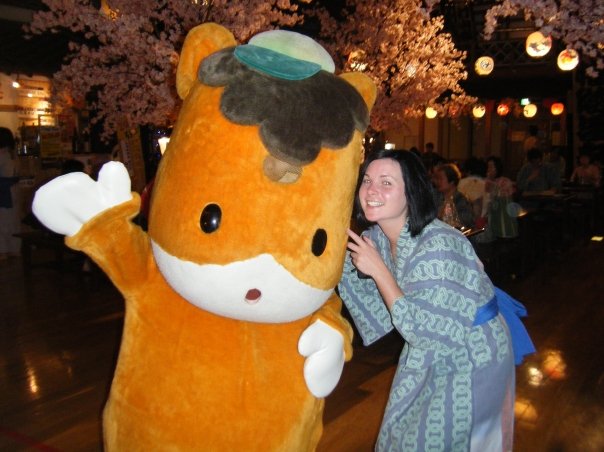At Japanese schools, the teachers all have their desks in the same room. So all day I am lesson planning and studying Japanese to the sound of shuffling papers and conversations in a language I don't understand. This was quite hard to get used to, because when I'm trying to come up with new ideas (as I always am for English lessons) I usually need my own space and absolute quiet in which to think clearly. It's also a good setting in which to become completely paranoid that EVERYONE is talking about you. But I have mostly gotten over that by now..
So anyway, the teachers are all in one room, and students are always coming in and out for various reasons. Everytime a student enters the teachers room they call out a loud "Shitsureishimasu!!!" "Sorry to interrupt!" or more accurately, "I'm interrupting!" So of course, some of the boy students use this as an opportunity to be particularly loud and obnoxious. One day, after a thundering "Shitsureishimasu!!" from one of the students at my Technical Highschool, an English teacher commented on how polite this young man was being. 'Polite??' I thought. Surely thats a prime example of how young boys take every opportunity they can to be smart-asses? But she explained that his loud speaking was a way of being respectful towards the teachers.
I then thought about the daily ritual of saying good morning to every teacher you come across, and how I've never managed to really get the technique down for making it feel natural and not painfully awkward. I suppose part of the reason is due to my awesomely conspicious foreign face - the most crazy thing a Japanese person could EVER encounter. But I also think perhaps my shy and guarded way of saying it is also partly to blame.
So I decided to experiment. I made a point of saying good morning or good day to people I passed in a very firm and deliberate way. And I found that I received a more positive response from people and generally felt more acknowledged.
My theory:
Japanese society is based on the concept of "Gambatte" or 'perserverance.' My half-assed greeting style is a symbol of lack of commitment or weakness. In a groupminded setting, this weakness is not something that needs to be supported or sympathised with. When the group is more important than the individual, energy cannot be wasted on trying to scaffold weaker members, and so little attention is paid to people who are performing below the standard set by the group.
Western society:
But maybe this positive reaction to a display of confidence is not peculiar to Japan and maybe I am learning just as much about behavioural communication in my own country.
I welcome any criticism from the reader, as my interpretations are definitely not air-tight.
I have been in Japan for 10 months, and the longer I've been here, the more blurred are the lines between what is unique to Japan and what is found the world over. Mys basis for comparision is a little too far gone! Hopefully this blog will help me to be objective toward my own ideas.
Subscribe to:
Post Comments (Atom)

No comments:
Post a Comment